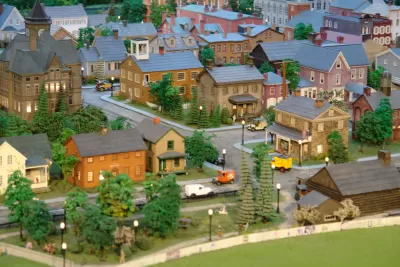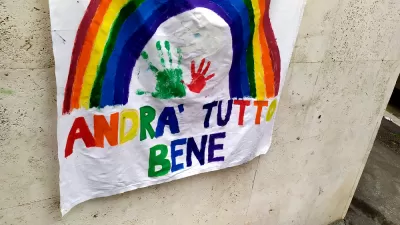In the same vein that Robert Putnam explored decaying community and social capital in American in his work, Bowling Alone, Brian Bethune discusses how the decay of Western communities shapes our health and political realms.

As Brian Bethune reports in Maclean's, many studies have shown we are disconnected with our neighbors more and more. Indeed, "more than 30 per cent of Canadians now say they feel disconnected from their neighbours, while half of Americans admit they don’t know the names of theirs. A recent poll of 2,000 Britons found a third declaring they couldn’t pick their near neighbours out of a police lineup."
This lack of neighborhood is detrimental for our health, according to Susan Pinker, citing research that shows how quality face-to-face contact "fortifies immune systems, calibrates hormones and increases chances of surviving heart attacks, strokes, AIDS and cancer." With this neighborly disconnect the "modern definition of a good neighbour is no longer someone who is part of your life, someone you chat with over the fence, a reliable shoulder in good times and bad, but someone who doesn’t bother you, either in your enjoyment of your home or by threatening its property value", comments Bethune.
Bethune goes on to discuss how American neighborhoods are now homogenized "not by ethnicity but by income, lifestyle and, above all, attitude," and Canadian neighborhoods more and more reflect political party lines, especially in urban areas.
FULL STORY: The end of neighbours

Manufactured Crisis: Losing the Nation’s Largest Source of Unsubsidized Affordable Housing
Manufactured housing communities have long been an affordable housing option for millions of people living in the U.S., but that affordability is disappearing rapidly. How did we get here?

Americans May Be Stuck — But Why?
Americans are moving a lot less than they once did, and that is a problem. While Yoni Applebaum, in his highly-publicized article Stuck, gets the reasons badly wrong, it's still important to ask: why are we moving so much less than before?

Using Old Oil and Gas Wells for Green Energy Storage
Penn State researchers have found that repurposing abandoned oil and gas wells for geothermal-assisted compressed-air energy storage can boost efficiency, reduce environmental risks, and support clean energy and job transitions.

Updating LA’s Tree Rules Could Bring More Shade to Underserved Neighborhoods
A new USC study finds that relaxing Los Angeles’ outdated tree planting guidelines could significantly expand urban tree canopy and reduce shade disparities in lower-income neighborhoods, though infrastructure investments are also needed.

California's Canal Solar Projects Aim to Conserve Resources and Expand Clean Energy
California’s Project Nexus has begun generating electricity from solar panels installed over irrigation canals, with researchers and state agencies exploring statewide expansion to conserve water and boost clean energy production.

HHS Staff Cuts Gut Energy Assistance Program
The full staff of a federal program that distributes heating and cooling assistance for low-income families was laid off, jeopardizing the program’s operations.
Urban Design for Planners 1: Software Tools
This six-course series explores essential urban design concepts using open source software and equips planners with the tools they need to participate fully in the urban design process.
Planning for Universal Design
Learn the tools for implementing Universal Design in planning regulations.
Heyer Gruel & Associates PA
City of Moreno Valley
Institute for Housing and Urban Development Studies (IHS)
City of Grandview
Harvard GSD Executive Education
Salt Lake City
NYU Wagner Graduate School of Public Service
City of Cambridge, Maryland



























